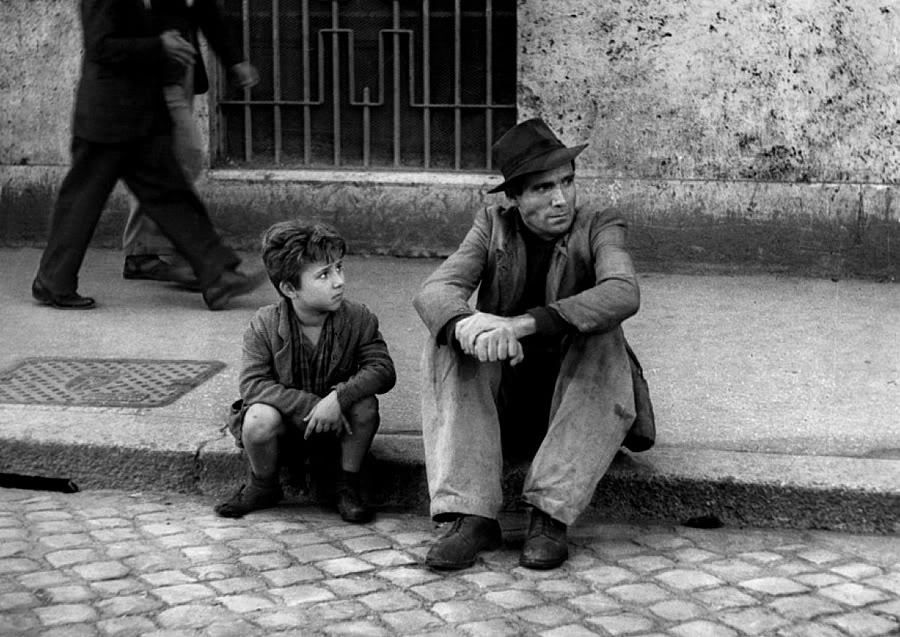
29 Jan In Bicycle Thieves, De Sica puts a human face to the noise
By Arman Saxena
People yelling, cars screeching, and crowds running. This is Bicycle Thieves’ sonic landscape, a collage of sounds used to depict the constant bustle of post-war Rome. Antonio and his family are victims of this noise, the noise allowed his bike, his livelihood, to be stolen and the noise catches him when he himself, in a moment of desperation, resorts to thievery.
At the beginning of the film, Antonio is separate from the noise. A crowd of bodies jostles against each other as they await the municipal employment officer, hoping that this will be the day they are offered a job. But Antonio sits apart from the crowd, he does not see himself as one of them, he will not resort to the same fervent desperation. And when he is the one offered the job, a man from inside the crowd has to go fetch him so he can receive his offer. He stands above the mass of people, though as the film will remind us, this is only for a moment, and he soon returns down the steps, back to the masses. Once Maria sells their wedding sheets and Antonio buys the bike we see the couple at their happiest, smiling wide as they cruise down the streets of Rome. Things seem hopeful for the first time in the film, as if Antonio won’t have to continue struggling so arduously to support his family. He finally has agency as a man, no longer is his eight year old son the household’s main breadwinner, he has reclaimed his position as head of the family. Of course, this does not last long. As soon as he loses his bike, Antonio becomes obsessed and desperate.
For many, it is incredibly difficult to empathize with a crowd or a collective. They can pity them for what they represent but true empathy for those human beings is absent. What De Sica does in Bicycle Thieves is he isolates Antonio from the crowd, focusing on him and his family, while initially implying that he is in a way different from the noise that engulfs him. He is not drowned by the noise, he works towards his goals in spite of it. However, De Sica is really not interested in promoting some idea of exceptionalism triumphing over poverty. After Antonio is caught attempting to steal the bike outside the wealthy man’s home and is eventually let go, he and Bruno slowly stumble down the streets of Rome. There are tears in both their eyes and they tightly grasp onto each other’s hands as they join the masses, the camera cutting to a rearview wide shot as their identifying characteristics dissolve further and further into the sea of noise. Antonio was doomed from the start. He was never going to escape the noise no matter how hard he tried. We empathize with Antonio. And when Antonio rejoins the crowd, we begin to truly empathize with the noise, which is what I believe to be the film’s purpose.
Roger Ebert famously described films as “machines that generate empathy” and De Sica’s film is one of the most effective examples of that idea. Empathy is not pity. There is a barrier in pity between the pitied and who is pitying. There are no barriers in empathy, both humans are on the same level, the same playing field. I think De Sica purposefully depersonalizes the masses occupying the Rome streets. Of course, there are major exceptions to this, including the mother of the young ruffian who Antonio accuses of thievery and the old man who Antonio interrogates and threatens. It is no mistake that the people Antonio acts belligerently towards are those who are even lower on the social scale than he is, the old man is going to church solely for the purpose of a decent meal and the elderly mother has been waiting for her son to get a job for over a year. It is also no mistake that while no one runs after the man that steals Antonio’s bike, a whole mob, many of which are decked out in suits, follows Antonio once he steals the bike of a wealthy man. While neorealism’s thesis is about observation and generating empathy just through the act of depicting human experience, there is a palpable anger in the film’s margins that bleeds to the surface through scenes like these.
When we first see him and his impoverished surroundings, many will pity Antonio and his family. As the film goes on, however, we spend more time with Antonio. We see the smiles he shares with his wife when he gets the bike and the tears he sheds once he has accepted that he won’t get it back. We see every aspect of their lives and no matter who the viewer is, it is impossible not to find similarities between his character and themselves. And by the time the word “Fin” has appeared on the frame, that initial pity has transformed into empathy.
